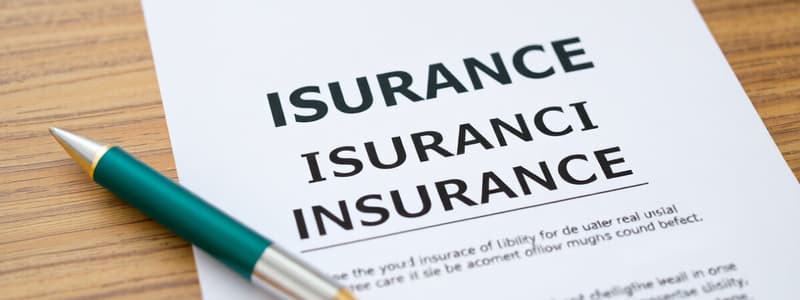Podcast
Questions and Answers
What is the primary purpose of requiring insurance in contracts?
What is the primary purpose of requiring insurance in contracts?
- To increase project costs
- To promote competition among contractors
- To manage risk and provide financial protection (correct)
- To avoid legal responsibilities
Which insurance policy is specifically designed to protect professionals from errors in their services?
Which insurance policy is specifically designed to protect professionals from errors in their services?
- Product Liability Insurance
- Worker's Compensation Insurance
- Public Liability Insurance
- Professional Indemnity Insurance (correct)
What type of insurance is required by employers for employees who suffer work-related injuries?
What type of insurance is required by employers for employees who suffer work-related injuries?
- Professional Indemnity Insurance
- Public Liability Insurance
- Workers Compensation Insurance (correct)
- Product Liability Insurance
Which factor is NOT considered a key policy consideration when evaluating insurance?
Which factor is NOT considered a key policy consideration when evaluating insurance?
Which of the following is a common cause of disputes in contracts?
Which of the following is a common cause of disputes in contracts?
What defines the onset of a dispute between contracting parties?
What defines the onset of a dispute between contracting parties?
Which of the following resolves disputes through non-binding negotiation?
Which of the following resolves disputes through non-binding negotiation?
What is a primary disadvantage of arbitration as a dispute resolution method?
What is a primary disadvantage of arbitration as a dispute resolution method?
Which claim type arises specifically from statutory laws like Australian Consumer Law?
Which claim type arises specifically from statutory laws like Australian Consumer Law?
Which type of liability insurance covers damages caused by products that are faulty?
Which type of liability insurance covers damages caused by products that are faulty?
What type of insurance is essential for contractors to cover their financial responsibility for damages caused to others?
What type of insurance is essential for contractors to cover their financial responsibility for damages caused to others?
Which statement about Alternative Dispute Resolution (ADR) is correct?
Which statement about Alternative Dispute Resolution (ADR) is correct?
What is a primary characteristic of Workers Compensation Insurance?
What is a primary characteristic of Workers Compensation Insurance?
What aspect does NOT typically fall under the scope of coverage for insurance?
What aspect does NOT typically fall under the scope of coverage for insurance?
Which type of claim typically arises from a breach of contract?
Which type of claim typically arises from a breach of contract?
Which of the following is a disadvantage of mediation in dispute resolution?
Which of the following is a disadvantage of mediation in dispute resolution?
In which situation would Product Liability Insurance be relevant?
In which situation would Product Liability Insurance be relevant?
What generally triggers the formal onset of a dispute?
What generally triggers the formal onset of a dispute?
What is a primary advantage of arbitration compared to traditional court proceedings?
What is a primary advantage of arbitration compared to traditional court proceedings?
Which of the following is NOT a type of insurance policy relevant to contractors?
Which of the following is NOT a type of insurance policy relevant to contractors?
Flashcards are hidden until you start studying
Study Notes
Insurance in Contracts
- Insurance is vital for managing risk in contracts: Both parties are financially protected in case of losses caused by one party.
- Liability insurance safeguards contractors against financial responsibility for damages they cause.
Types of Insurance Policies
- Public Liability Insurance: Protects against legal liability for injuries or damages to third parties.
- Workers Compensation Insurance: Provides benefits for employees injured during work, mandatory for employers.
- Professional Indemnity Insurance: Covers professionals like lawyers and architects against liability for errors in their services.
- Product Liability Insurance: Protects against harm caused by faulty products manufactured or sold by the insured.
- Works Insurance: Covers losses or damages to construction works and equipment on-site.
Key Policy Considerations
- Scope of Coverage: Defines the extent of coverage, whether annual or project-specific, and if subcontractors are included.
- Exclusions and Limitations: Identifies risks or claims not covered by the policy.
- Level of Cover: Ensures adequate insurance for the project's scale.
Dispute Resolution Methods
- Common Dispute Causes: Disputes may arise from conflicting interpretations of the contract, unforeseen conditions, delays, and financial issues.
- Defining a Dispute: A claim officially becomes a dispute when the other party formally rejects it.
- Types of Claims:
- Contract-based: Stem from specific contract terms, like variations or defective work.
- Statutory: Claims made under legal frameworks like Australian Consumer Law.
- Common Law: Claims for breach of contract and negligence.
- Alternative Dispute Resolution (ADR): Refers to methods outside of court proceedings, such as mediation and arbitration.
- Mediation: Parties negotiate a solution with the assistance of a neutral mediator.
- Advantages: Private, informal, quick, cost-effective, confidential, flexible.
- Disadvantages: Non-binding, one party may withdraw at any time.
- Arbitration: A formal process where an arbitrator makes a binding decision, enforceable like a court judgment.
- Advantages: Private, binding, faster than litigation.
- Disadvantages: Parties relinquish control, limited appeal options.
- Expert Determination: An expert (often in technical areas) resolves the dispute based on contract terms, binding if agreed upon.
- Advantages: Efficient, suitable for technical disputes, confidential.
- Disadvantages: Difficult to challenge, limited appeal options.
- Mediation: Parties negotiate a solution with the assistance of a neutral mediator.
- Litigation: Formal court proceedings where a judge decides the dispute based on law.
- Advantages: Final, binding, appeals are possible.
- Disadvantages: Public, costly, formal, can strain business relationships.
Drafting Dispute Resolution Clauses
- Define each step clearly, including timelines and triggers for action.
- Specify whether a resolution step is final and binding.
- Choose confidential methods like mediation or arbitration if privacy is important.
Purpose of Insurance in Contracts
- Insurance is essential for managing risk in contracts.
- Insurance protects parties from financial loss in case one party causes damage or loss.
- Contractors need liability insurance to cover damage or loss caused by their actions.
Types of Insurance Policies
- Public liability insurance covers injury or damage to third parties.
- Workers compensation insurance provides benefits for work-related injuries to employees.
- Professional indemnity insurance protects professionals (e.g., lawyers, architects) from liability for errors in their services.
- Product liability insurance covers harm caused by the insured's faulty products.
- Works insurance covers loss or damage to construction works and equipment.
Key Policy Considerations
- The scope of coverage should be clear - annual policy or project-specific, includes subcontractors.
- Exclusions and limitations should be identified - what risks or claims are not covered?
- The level of cover should be sufficient for the project's scale.
Common Dispute Causes
- Disputes arise from differences in contract interpretation.
- Unforeseen site conditions, delays, and financial issues are common causes of disputes.
Defining a Dispute
- A dispute arises when a party makes a claim which is formally rejected by the other party.
Types of Claims
- Contract-based claims arise from specific contract terms, like variations or defective work.
- Statutory claims are based on laws like Australian Consumer Law.
- Common law claims involve claims for breach and negligence.
Dispute Resolution Methods
- Alternative dispute resolution (ADR) methods are alternatives to court proceedings.
- Common ADR methods include mediation, arbitration, and expert determination.
Mediation
- A neutral mediator helps parties negotiate a solution.
- Mediation is private, less formal, quicker, and cheaper than court proceedings.
- ** Advantages**: Confidentiality, flexibility, and reduced cost.
- Disadvantages: Non-binding, and a party can withdraw at any time.
Arbitration
- A formal process where an arbitrator makes a binding decision.
- Faster than court, and enforceable like a court judgment.
- Advantages: Private, binding, and faster than litigation.
- Disadvantages: Parties lose control, limited appeal options.
Expert Determination
- An expert (often in technical fields) decides the dispute based on contract terms.
- It's binding if agreed upon by the parties.
- Advantages: Efficient, suitable for technical disputes, confidential.
- Disadvantages: Challenging to overturn the decision, no right to appeal.
Litigation
- Formal court proceedings where a judge resolves disputes based on the law.
- Advantages: Final, binding, appeals are possible.
- Disadvantages: Public, costly, formal, and can strain business relationships.
Drafting Dispute Resolution Clauses
- Each step in the dispute resolution process should be clearly defined.
- Timelines and triggers for each action should be specified.
- The clauses should clearly state whether a particular resolution step is final and binding.
- Consider using confidential methods (e.g., mediation, arbitration) for privacy.
Studying That Suits You
Use AI to generate personalized quizzes and flashcards to suit your learning preferences.




